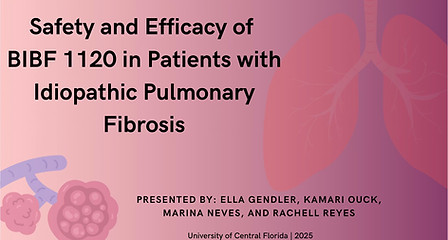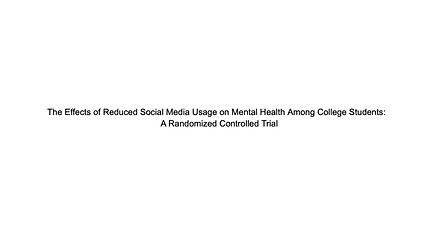Research Projects
This joint research initiative looks at the safety and effectiveness of BIBF 1120 (Nintedanib) in patients with Idiopathic Pulmonary Fibrosis (IPF). IPF is a progressive lung disease with few therapy choices, thus assessing possible therapeutics is critical. Our team of researchers examined clinical trial data to determine the efficacy of BIBF 1120 in delaying disease development, controlling symptoms, and reducing side effects. The findings add to a growing corpus of research focused on improving treatment techniques and improving people's quality of life with IPF.
This randomized controlled trial explores the effects of reduced social media usage on the mental health of college students. With mental health concerns such as anxiety, depression, and stress becoming increasingly prevalent among young adults, identifying effective non-pharmacological interventions is essential. Our research team investigated whether limiting social media exposure could lead to measurable improvements in psychological well-being. Using validated assessment tools, we compared outcomes between students who reduced their social media usage and those who maintained typical usage patterns. The results contribute to a growing body of literature aimed at understanding the impact of digital behavior on mental health and developing strategies to support student wellness.
This research project investigates the link between excessive alcohol use and death rates among persons with dementia. Given that dementia is a prominent cause of cognitive decline and death, knowing the effect of alcohol usage on disease development is critical. The study looks at available data and published literature to determine how excessive alcohol use affects dementia-related fatality rates. This study intends to highlight the possible effects of alcohol abuse in adults with dementia by evaluating patterns and risk variables, as well as the necessity of preventative healthcare interventions.
As part of a joint research study, my colleagues and I investigated the accuracy of artificial intelligence models in predicting sepsis outcomes, as well as their effects on early identification and patient survival rates. Sepsis is a major medical emergency, and delayed diagnosis frequently results in greater fatality rates. Our study examined machine learning and deep learning approaches, such as recurrent neural networks and ensemble models, to determine their accuracy in predicting sepsis onset. We conducted a thorough literature study using databases to evaluate the sensitivity, specificity, and real-world applicability of AI-driven prediction models. This initiative inspired my enthusiasm for healthcare innovation and data-driven solutions, emphasizing AI's revolutionary potential to improve patient outcomes.
I'm always eager to explore new research opportunities and collaborate on innovative projects! If you're looking for a dedicated and passionate researcher, I'd love to connect and contribute. Feel free to reach out to discuss potential collaborations!
Phone
417-693-7750






